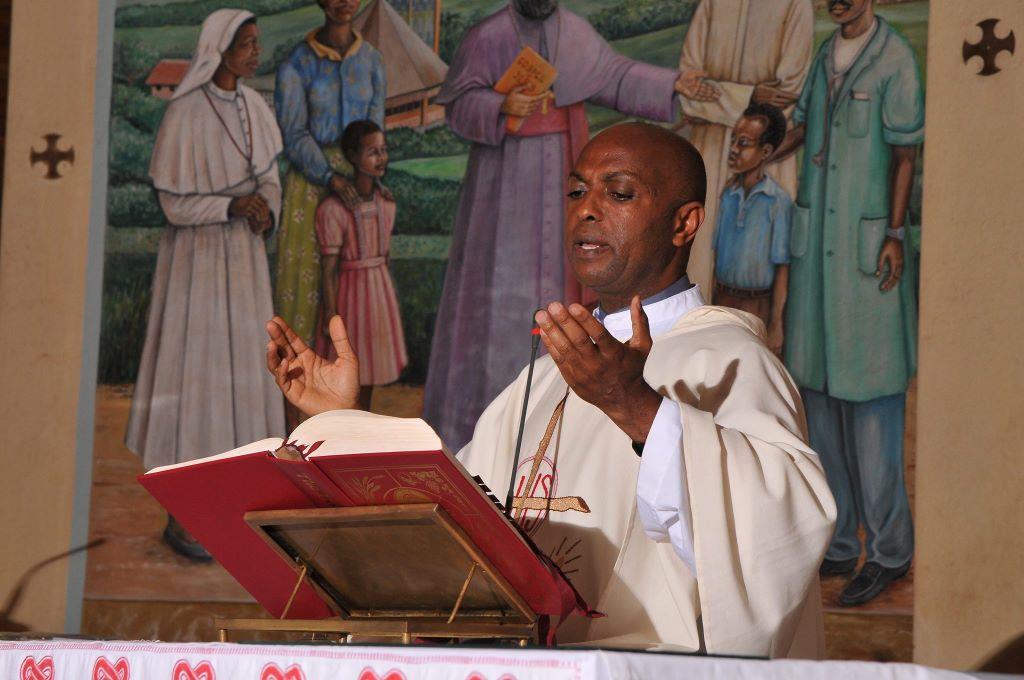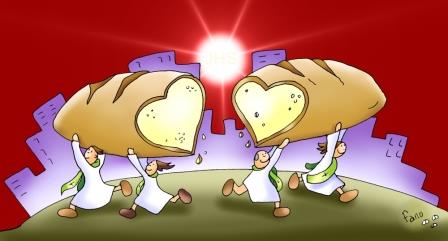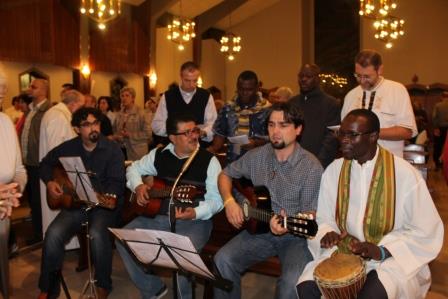Daniel Comboni
Comboni Missionaries
Institutional area
Other links
Newsletter
Thursday, November 28, 2013
At the end of the reflection that the Institute has done this year on Fraternity and Reconciliation we propose a prayer meeting that can be organized at the level of the community or of some neighbouring communities or of a whole zone to ask together for the gift of mutual forgiveness and reconciliation. In the picture: Fr. John Mungereza in Kampala (Uganda).
BROTHERHOOD AND RECONCILIATION IN THE COMBONI COMMUNITY
TEXT FOR LITURGICAL PRAYER
Preparation of the symbols that can represent the path of reconciliation and healing within our communities
(May be those listed below or others, placed at the centre of the chapel or hall where this prayer will take place or introduced at a certain stage of the celebration):
- A jar of oil and a bottle of wine (see: the Good Samaritan)
- A jug of water and a cloth (see: the washing of the feet)
- Some stones, thorny branches, green branches
- A broken bread
- A chain of rings of paper incomplete in some places.
SUGGESTIONS ABOUT THIS PRAYER MEETING
Commentator: The divisions, which exist in the world and in the Church, exist also among us. We are often wounded or cause wounds as persons or as communities. Forgiveness, reconciliation, mutual acceptance and brotherhood often remain distant ideals of our community life. This makes us waste a good amount of energy and negatively affects our mission to be witnesses and promoters of reconciliation and brotherhood in our apostolic communities, among peoples, cultures and religions. Conscious of this situation and willing for a greater commitment on the part of everyone, let us ask the Lord, in this celebration, for the gift of reconciliation in ourselves, our community, the Church and the world, so that our mission and our witness may be more credible.
Ø Song to the Holy Spirit
Priest/ In the name of the Father and of the Son and of the Holy Spirit.
All/ Amen.
P/ The Lord be with you.
A/ And with your Spirit.
Ø Prayer of the person presiding
1. LITURGY OF THE WORD
Commentator: St Paul teaches us a sure way to fraternity and reconciliation: charity without pretence and trying to outdo one another in mutual esteem.
Reader: Letter of St Paul to the Romans (12:9-18)
Let love be without hypocrisy. Abhor that which is evil. Cling to that which is good. In love of the brothers be tenderly affectionate to one another; in honour preferring one another; not lagging in diligence; fervent in spirit; serving the Lord; rejoicing in hope; enduring in troubles; continuing steadfastly in prayer; contributing to the needs of the saints; given to hospitality. Bless those who persecute you; bless, and don’t curse. Rejoice with those who rejoice. Weep with those who weep. Be of the same mind one toward another. Don’t set your mind on high things, but associate with the humble. Don’t be wise in your own conceits. Repay no one evil for evil. Respect what is honourable in the sight of all men. If it is possible, as much as it is up to you, be at peace with all men.
The Word of the Lord
Responsorial Psalm
How pleasant it is when brothers live in unity
1. How good and pleasant it is
when brothers live in unity!
2. It is like precious oil upon the head
Running down upon the beard,
running down upon Aaron’s beard
upon the collar of his robes.
3. It is like the dew of Hermon which falls
On the heights of Zion.
For there the Lord gives his blessing,
life for ever.
Commentator: One of the greatest obstacles we meet in social and community life is the ambition for power, the struggle to take the most important posts. Jesus teaches a completely different way: to strip oneself of all ambition to have the most important posts in order to be servants of all.
Reader: The Gospel according to Mark (10:35-45)
James and John, the sons of Zebedee, came near to him, saying, “Teacher, we want you to do for us whatever we will ask.” He said to them, “What do you want me to do for you?” They said to him, “Grant to us that we may sit, one at your right hand, and one at your left hand, in your glory.” But Jesus said to them, “You don’t know what you are asking. Are you able to drink the cup that I drink, and to be baptized with the baptism that I am baptized with?” They said to him, “We are able.” Jesus said to them, “You shall indeed drink the cup that I drink, and you shall be baptized with the baptism that I am baptized with; but to sit at my right hand and at my left hand is not mine to give, but for whom it has been prepared.”
When the ten heard it, they began to be indignant towards James and John. Jesus summoned them, and said to them, “You know that they who are recognized as rulers over the nations lord it over them, and their great ones exercise authority over them. But it shall not be so among you, but whoever wants to become great among you shall be your servant. Whoever of you wants to become first among you, shall be bondservant of all. For the Son of Man also came not to be served, but to serve, and to give his life as a ransom for many.”
The Gospel of the Lord
From the Rule of Life (RL 36)
Their fellowship of life corresponds to the social character of their nature as created by God; it has its beginning and model in the Trinity, and fulfils Christ’s prayer «that all may be one». It is a visible sign of the new humanity born of the Spirit that becomes a concrete proclamation of Christ: «May they be perfect in unity so that the world may believe that you have sent me».
2. SHARING
Ø A brief reflection by the one presiding at the celebration which opens a moment of sharing that can be oriented by the following questions:
1. How can we manage our differences in age, culture, formation... so that these may not be occasions of aggression but of solidarity?
2. How to recognize and heal the wounds in our community/Institute so that these may become signs of tolerance, compassion and forgiveness?
3. Practically, which paths of reconciliation and mutual forgiveness does our community need?
4. In our community, which concrete attitudes can help us to compete in mutual esteem?
5. How can we, in our daily routine, heed to Jesus’ invitation not to aspire to power as the great of this world do, but to live the humble and brotherly service?
6. What does it mean to live our mission as injured ministers?
7. What have we discovered of new or useful in reading the inserts of the Comboni Family of this year on Fraternity and the Paths of reconciliation?
3. ASKING FOR FORGIVENESS
Ø Guide: The Word heard and broken among us motivates us to ask for forgiveness.
P/ Let us ask forgiveness to the Lord and to our brothers for all our shortages against fraternal communion and against our mission of announcers and instruments of peace.
P/ Lord, for not having done of fraternity the centre of our relationships.
A/ Lord, have mercy.
P/ Lord, you continue to ask: Where is your brother? But we pretend not to hear.
A/ Lord, have mercy.
P/ Lord, for striving for privileges and to have dominion over others when you call us to be brothers in justice and impartiality.
A/ Lord, have mercy.
P/ Lord, for having lived fraternity, which is constitutive of our being Comboni, as a cross and a heavy burden to carry.
A/ Lord, have mercy.
P/ Lord, for all the times that, instead of making our wounds the place of solidarity with our brothers, we made them the occasion of conflict and aggression.
A/ Lord, have mercy.
P/ Lord, for blaming our dissatisfaction and failures on others or on structures.
A/ Lord, have mercy.
P/ Lord, for the anger and resentment that we carry within us due to past situations that we do not want to accept.
A/ Lord, have mercy.
P/ Lord, for our fears, anxieties and compulsions that make us unhappy and make others suffer.
A/ Lord, have mercy.
P/ Lord, for failing to make of our wounds an Easter journey that communicates life to us and to others.
A/ Lord, have mercy.
P/ Lord, for the times that we failed to commit ourselves to justice, peace and the integrity of creation or have ridiculed those who work in this field.
A/ Lord, have mercy.
P/ Lord, for our superficiality and lack of attention to the signs of the times which should guide our mission.
A/ Lord have mercy
P/ Lord, for the times that we have not recognized the wounds present in our community and in our Institute and did not commit ourselves to heal them.
A/ Lord, have mercy.
P/ Lord, for everything in us and among us that has fuelled racism, intolerance, discrimination, prejudice, conflicts interethnic nationalism and sexism.
A/ Lord, have mercy.
P/ Lord, for the divisions that have been present in the history of our Institute and have impeded our evangelical and missionary witness.
A/ Lord, have mercy
Ø Other spontaneous invocations.
P/ May almighty God have mercy on us, forgive us our sins and bring us to everlasting life.
A/ Amen.
P/ Let us pray: Lord, you are our Father and we are all brothers, give us your Spirit of love and peace so that our community may become reconciled, as a sign of the love of the Trinity. We pray that from your only Son, who died on the cross for the salvation of all, we may learn that forgiveness is the only path to true peace. We ask this of you who live and reign forever and ever. A/ Amen.
4. RECONCILIATION AND MUTUAL CARE
Ø At this time we suggest a gesture that expresses the need and commitment to reconciliation and mutual healing, for example:
- Wash and dry one another’s hands
- Anoint one another a palm of the hand
- Everyone removes a thorny branch to express their commitment
- To link together the broken chain of paper.
5. OUR TANGIBLE COMMITMENT OF RECONCILIATION which we intend to take up as a community.
Ø Hymn of praise
P/ Now let’s say together the prayer that Jesus taught us, asking the Father for the grace to live in true fraternity.
A/ Our Father who art in heaven...
Let us pray: Holy Trinity, the perfect model of a community, help us to overcome our differences, to reconcile and restore true peace among us, an eloquent sign for an effective mission. We ask this of you who live and reign forever and ever.
A/ Amen.
P/ The Lord be with you.
A/ And with your spirit.
P/ May God Almighty bless us, the Father, the Son and the Holy Spirit.
A/ Amen.
P/ Let us go in peace.
A/ Thanks be to God
Ø Song to Mary or to St. Daniel Comboni.
5. CELEBRATING THE JOY OF BEING A COMMUNITY
Ø It is suggested that the prayer is followed by a moment of fraternity: a festive meal, refreshment…
Fr. Jorge García Castillo and Fr. Siro Stocchetti






